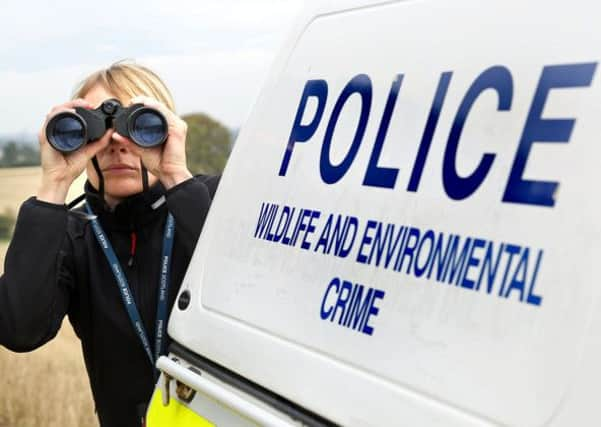Wildlife crime in Scotland is ‘under-reported’


A report by Scottish Environment LINK, which represents more than 35 environmental organisations, highlights “weaknesses” in the detection, policing and prosecution of crimes against wildlife.
Only 20 (13.5 per cent) of the 148 confirmed wildlife crimes reported to the police during 2008-2013 resulted in a prosecution, according to research published by the charity.
Advertisement
Hide AdAdvertisement
Hide AdThe authors state: “Overall, but with a few noticeable exceptions, there is, amongst LINK members, an overwhelming lack of confidence in the ability of the statutory agencies to adequately investigate wildlife crime and in the willingness of the judiciary to impose meaningful deterrent sentences.”
The charity has made 20 recommendations for government, police and prosecutors, with the aim of eradicating wildlife crime in Scotland.
Police Scotland should agree a wildlife crime strategy in consultation with environmental groups and the Crown Office and Procurator Fiscal Service (COPFS) should investigate why such a high percentage of cases fail to be prosecuted and pursue stiff sentences, it said.
The research also raises concerns about the approach to tackling wildlife crime through the Partnership Against Wildlife Crime Scotland (Paws), which includes the police, land managers, environmental groups and the Scottish Government.
It states: “If the partnership approach is to continue, the Scottish Government should commission research to assess the true extent of the different types of wildlife crime in Scotland and remove any group tainted significantly by association with any area of wildlife crime from Paws.”
The Scottish Government should also consider how wildlife crime connected to a specific piece of land might lead to the withdrawal of subsidies associated with land ownership, Scottish Environment LINK said.
Ian Thomson, head of investigations at RSPB Scotland, a member of LINK, said: “Together, these papers should be a wake-up call for those involved in tackling wildlife crime.
“A law is only as good as its enforcement and the comprehensive analysis contained in these papers shows that this is far from good enough here in Scotland.”
Advertisement
Hide AdAdvertisement
Hide AdProsecutors said the report was “ill informed and based on flawed methodology”.
A COPFS spokesman said: “The Crown rejects the finding of this report on the basis that many of the conclusions are inaccurate.
“There was no consultation with us prior to publication and therefore no context for the erroneous conclusions and recommendations which appear to be supported by examples which are outdated and anecdotal at best.
“The Crown will raise these concerns directly with Scottish Environment LINK.
“Official figures show that in 2013 prosecutions took place in 98 per cent of cases where there was sufficient evidence in law to do so.”
Police Scotland said officers were committed to investigating all reports of suspected wildlife crime.
A spokeswoman said: “Investigations into the suspicious deaths of wildlife are complex, difficult and prolonged. The areas covered can be vast and remote, and it is seldom immediately apparent whether wildlife has died as the result of criminality.
“This report covers crimes recorded between 2008 and 2013. Since April 2013, Police Scotland, as a single force, has brought a consistent, high level of investigation and investigative scrutiny to all reported wildlife crime, working closely with our key partners.
Advertisement
Hide AdAdvertisement
Hide Ad“We have a network of dedicated wildlife crime officers across the country with extensive experience and are introducing a new training course for police officers which will substantially increase the number of officers with specialist understanding of wildlife crime.”
Douglas McAdam, chief executive of Scottish Land and Estates, said: “Like every organisation with the interests of rural Scotland at heart, we share the stated ambition of the LINK report - to eradicate wildlife crime in Scotland.
“It is, however, disappointing that in pursuit of this ambition and preparation of this report LINK did not consult organisations that are actively involved in tackling wildlife crime and form Paws.
“A sustained effort is required to address the problem and that is what Paws delivers.
“The LINK report seems to dismiss the official statistics produced by the Scottish Government in recent years which show most types of wildlife crime in Scotland have reduced in recent years or are now stable at single figure or teens of incidents recorded by police each year.”
A spokesman for the Scottish Gamekeepers Association said: “There are many partner organisations involved in tackling wildlife crime in Scotland, ourselves included, and all groups are entitled to call for things in public.
“However, this appears more to be a thinly-veiled public vote of no confidence in Police Scotland and a fight between who should have control over wildlife crime investigations and how they should operate.
“As a member representative organisation with no investigatory powers, we don’t want, therefore, to be drawn into an operational power battle between charities with investigative roles and the police service.”
Advertisement
Hide AdAdvertisement
Hide AdA Scottish Government spokeswoman said: “The Scottish Government has made tackling wildlife crime a priority.
“We have the strongest laws on wildlife crime in the UK, including vicarious liability, which was recently successfully used in the courts.
“We are reviewing the penalties for wildlife crime to ensure that they are an adequate deterrent and there are now arrangements in place to restrict the use of general licences where there are grounds to believe wildlife crime has taken place.
“We have been clear that we will continue to take whatever further steps are deemed necessary to deal with wildlife crime.”
SEE ALSO: